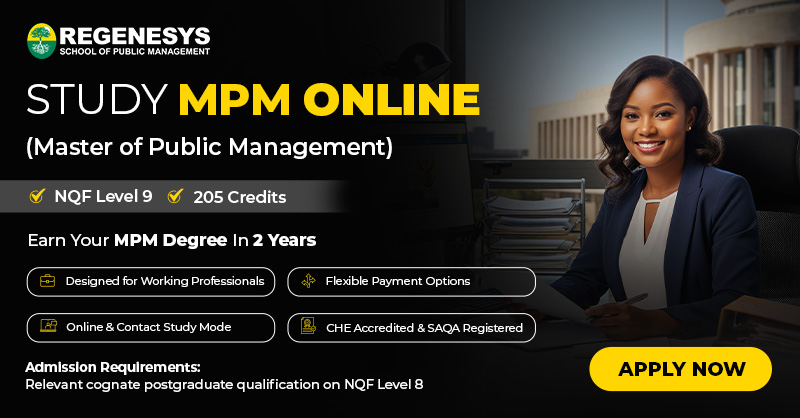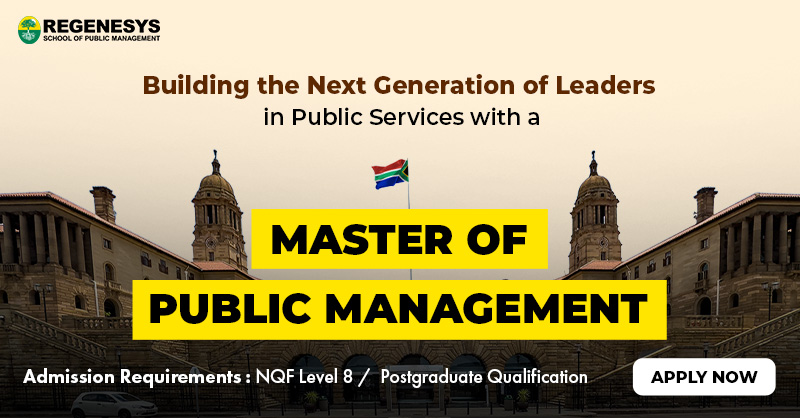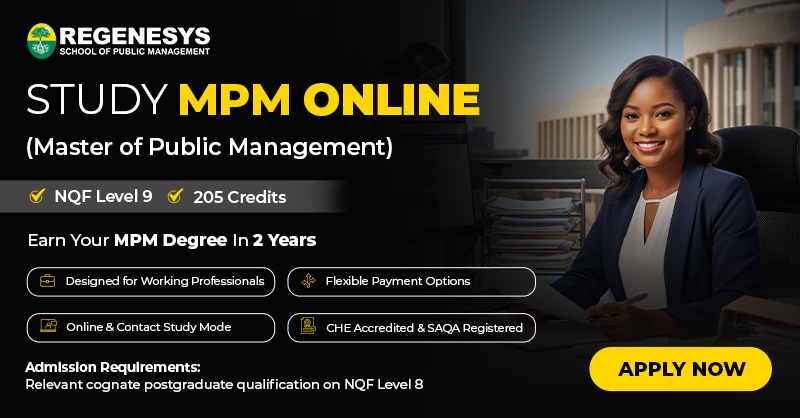Public management plays a central role in shaping South Africa’s economy, governance, and service delivery. From policy implementation to departmental leadership, the field demands professionals who can think strategically, manage people, and deliver results in complex environments. To meet this demand, programmes such as the Master of Public Management South Africa have set clear standards for entry. These Public Management admission requirements reflect the skills necessary to lead public institutions and influence change.
In this article, we will break down the MPM admission requirements in South Africa, explore minimum academic qualifications, SAQA and NQF standards, and the role of work experience.
Table of Contents
- What is the Master of Public Management in South Africa?
- Minimum Academic Qualifications for the Master of Public Management in South Africa
- SAQA and NQF Alignment of MPM SA Qualifications
- Work Experience as Part of Public Management Entry Criteria
- Entry Options for Online MPM South Africa Applicants
- English Proficiency in Public Management Admission Requirements
- Application Pre-Checks Before Applying for the Master of Public Management in South Africa
- Conclusion
- MPM admission requirements in South Africa – FAQ
What is the Master of Public Management in South Africa?
The Regenesys Master of Public Management (MPM) is a postgraduate qualification designed to develop advanced leadership, strategic, and management skills within the public sector. It equips professionals to oversee government departments, implement policies, and manage public resources effectively. The MPM admission requirements in South Africa ensure that candidates are prepared for the complexities of public administration, policy formulation, and governance challenges.
This programme blends theory and practice, focusing on strategic decision-making, ethical leadership, policy analysis, and organisational management. Graduates of a Master of Public Management in South Africa are capable of taking on senior roles in government, non-governmental organisations, and public institutions, contributing to service delivery and institutional improvement.

Minimum Academic Qualifications for the Master of Public Management in South Africa
Meeting the MPM admission requirements in South Africa begins with academic qualifications. To be considered for a Master of Public Management in South Africa, applicants must typically hold at least a bachelor’s degree at NQF Level 8 or higher.
This ensures that candidates have the academic foundation to succeed in postgraduate-level learning, particularly in fields connected to governance, policy, or Public Management. The Public Management entry criteria reflect the need for students to demonstrate readiness for advanced research, problem-solving, and critical analysis.
While exact requirements may differ slightly by institution, the principle is consistent: a strong academic base is crucial for postgraduate success. At Regenesys, the Master of Public Management offers a pathway for graduates who wish to continue specialised learning.
Listed below are the eligibility criteria for the Regenesys MPM admission requirements in South Africa:
- Relevant cognate postgraduate qualification on NQF Level 8
- Relevant work experience
- Basic computer skills, internet connection and relevant IT resources
- Competent in English, written and oral communication skills
Read more on Understanding the Significance of a Master of Public Management (MPM)
SAQA and NQF Alignment of MPM SA Qualifications
A critical part of MPM admission requirements in South Africa is alignment with the South African Qualifications Authority (SAQA) and the National Qualifications Framework (NQF). These systems maintain national quality standards, ensuring that MPM SA qualifications and related postgraduate pathways meet recognised benchmarks. For aspiring leaders, this alignment confirms that their qualification is credible, measurable, and valued across the Public Management and business sectors.
Employers, government agencies, and international organisations often review whether a qualification is NQF-aligned before considering candidates for senior roles. For students, this provides assurance that their learning outcomes are standardised, making it easier to progress academically or professionally.
Benefits of SAQA and NQF alignment for MPM SA qualifications include:
- Nationally recognised academic credibility.
- Clear standardisation of competencies and outcomes.
- Seamless progression into master’s-level programmes such as the MPM.
- Improved employability in both public sector and private management careers.
Read more on How Accreditation Affects the Recognition of Your Master of Public Management (MPM) Degree?

Work Experience as Part of Public Management Entry Criteria
Beyond academic qualifications, professional experience plays a critical role in Public Management entry criteria for postgraduate study. Public management education is most effective when learners can apply theoretical concepts to real-world public sector or organisational contexts. The MPM admission requirements in South Africa recognise that candidates with practical experience are better equipped to engage with advanced topics in governance, policy, and leadership.
While not all programmes mandate extensive work experience, having prior exposure to Public Management roles or leadership responsibilities significantly strengthens an application. Master of Public Management South Africa programmes often prioritise mid-career professionals, as they can directly translate classroom learning into workplace improvements and public service outcomes.
Professional experience supports MPM SA qualifications in several key ways, such as:
- Policy application in practice – Learners with workplace exposure can connect governance and policy theory directly to processes and challenges they have previously encountered.
- Leadership in real settings – Managerial experience allows students to test leadership frameworks against day-to-day responsibilities in departments, projects, or organisational initiatives.
- Research with practical relevance – Professionals draw on real workplace challenges and data to enrich research assignments, making findings more actionable and grounded.
- Problem-solving in governance – Exposure to service delivery or institutional issues helps learners apply theoretical tools to improve Public Management outcomes.
- Enriched peer learning – Experienced students contribute diverse perspectives to classroom discussions, creating more meaningful and contextually relevant debates rooted in South African Public Management realities.
This integration of work experience ensures that MPM students can link theory to practice, enhancing both learning outcomes and future leadership effectiveness in Public Management roles.
Read more on Navigating the Challenges of Public Management: Insights from MPM Graduates
Entry Options for Online MPM South Africa Applicants
Many South African professionals postpone postgraduate study until they have accumulated substantial work experience. To accommodate these candidates, MPM admission requirements in South Africa often provide mature entry options. These pathways recognise that applicants who may not hold traditional academic qualifications can still bring significant professional knowledge, leadership exposure, and practical skills highly relevant to Public Management and policy-making contexts.
Mature entry routes are designed to evaluate competence, experience, and potential rather than relying solely on formal academic credentials. Some programmes, including recognised pathways, allow entry via a bachelor’s degree at NQF Level 8 or an NQF Level 8 equivalent, ensuring that experienced professionals with alternative qualifications can still pursue advanced study.
Mature entry pathways that could be used as MPM admission requirements in South Africa include:
- Recognition of Prior Learning (RPL) – Acknowledging relevant professional experience and expertise.
- Detailed CV submission – Highlighting managerial, administrative, or leadership responsibilities.
- Motivational essays – Demonstrating the applicant’s readiness and commitment to postgraduate study.
- Professional references – Confirming leadership ability and practical impact in previous roles.
Read more on How Do MPM Graduates Make a Difference in Public Management?
English Proficiency in Public Management Admission Requirements
Effective communication is a cornerstone of leadership, and as such, English proficiency is a fundamental component of Public Management admission requirements. Since postgraduate coursework, assessments, and academic discussions are conducted in English, applicants must demonstrate the ability to read, write, and articulate complex ideas clearly.
The MPM admission requirements in South Africa emphasise communication as a critical leadership competency. Even when applying for an online MPM in South Africa, students are expected to express their ideas confidently, prepare policy-related documents, and present strategies in a professional setting.
Typical English proficiency requirements include:
- Evidence of prior education in English – Demonstrating academic ability through previous qualifications taught in English.
- Workplace communication skills – Showing competence in written and verbal communication through professional experience.
- Standardised test scores for international students – Such as IELTS, TOEFL, or equivalent, to verify proficiency.
Read more on Exploring Career Paths After Completing a Master of Public Management (MPM)
Application Pre-Checks Before Applying for the Master of Public Management in South Africa
Before submitting an application, it is essential for candidates to complete a thorough review of all MPM admission requirements in South Africa. Conducting pre-checks ensures that applicants meet the necessary academic, professional, and language criteria, reducing delays and increasing the likelihood of a successful application.
Structured preparation also helps applicants organise key documents, highlight relevant experience, and ensure that they are fully prepared for the demands of a postgraduate programme.
Checklist for applicants before submitting an application:
- Verify academic qualifications – Ensure possession of a recognised bachelor’s degree at NQF Level 8 or an equivalent qualification.
- Gather transcripts and certificates – Include proof of all prior qualifications to meet academic requirements.
- Prepare a professional CV – Highlight work experience, leadership roles, and responsibilities relevant to Public Management.
- Confirm English proficiency – Provide evidence of language skills through previous education or standardised test results.
- Ensure access to technology – Secure reliable internet, computer, and IT resources for online learning.
- Check upcoming intakes – Familiarise yourself with programme start dates to plan your application accordingly.
Completing these pre-checks ensures that candidates meet the Public Management entry criteria and are well-prepared to pursue postgraduate study in South Africa.
Read more on How Long Does It Take to Complete a Master of Public Management (MPM)?

Conclusion
Public management is central to South Africa’s governance, policy development, and service delivery. Professionals in this field must demonstrate strategic thinking, effective leadership, and the ability to manage complex organisational and societal challenges. Meeting the MPM admission requirements in South Africa ensures that candidates are academically prepared, professionally experienced, and capable of contributing meaningfully to Public Management roles.
Programmes such as the Master of Public Management South Africa offer structured pathways for professionals to deepen their expertise, develop leadership competencies, and enhance their impact in both public and private sectors. Completing a recognised, NQF-aligned qualification also positions graduates for career progression and further postgraduate study.
If you are ready to undertake specialised education in Public Management, visit the Regensys website today and apply for the upcoming October intake!
MPM admission requirements in South Africa – FAQ
What is the MPM admission requirements in South Africa?
Applicants to the Regeneys programme generally require a relevant postgraduate qualification at NQF Level 8 or an equivalent credential to demonstrate readiness for advanced study.
Is prior work experience required for MPM admission?
Work experience is required for admission to the Regenesys MPM programme. Experience in Public Management strengthens applications and enhances practical learning outcomes
How important is SAQA and NQF alignment for MPM qualifications?
Alignment ensures the qualification is nationally recognised, standardised, and credible for both employment and further study in Public Management.
What level of English proficiency is required?
Applicants must demonstrate the ability to read, write, and communicate in English, either through previous education, workplace communication, or standardised tests like IELTS or TOEFL.
What documents should I prepare before applying?
Key documents include academic transcripts, proof of qualifications, a professional CV, evidence of English proficiency, and any references or supporting letters for mature entry.
Are there online study options for MPM in South Africa?
Yes, several programmes, including Regenesys’s Master of Public Management, offer fully online pathways for the upcoming October intake, providing flexibility for working professionals.
How can work experience enhance my MPM studies?
Professional exposure allows students to apply theory to real-world governance challenges, enrich research projects, and contribute meaningfully to classroom discussions.







